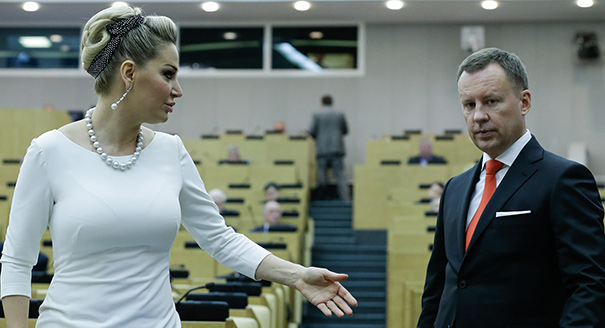Until the end of March, many saw Denis Voronenkov, a Russian lawmaker who fled to Ukraine in October, as a model for the future of the current Russian elite: the former Communist parliamentarian was a loyal Putinist, voting for the annexation of Crimea and endorsing the Kremlin’s support for separatism in eastern Ukraine, only to flee to Ukraine after losing his seat in the State Duma. Knowing that Putin’s reign won’t last forever, Russian politicians, security operatives, and government officials saw Voronenkov’s escape route to Ukraine as one they might have to take someday.
Their calculus changed drastically on March 23, when Denis Voronenkov was shot and killed in broad daylight in downtown Kiev. Contract killings, especially political ones, rarely get solved: the 1995 killing of Vladislav Listyev in Russia still hasn’t been solved, nor has last year’s assassination of journalist Pavel Sheremet in Kiev. There’s little reason to believe we will ever know who ordered Voronenkov’s murder, all the more so because his assailant died in a hospital from wounds inflicted by Voronenkov’s bodyguard.
But finding the culprit is less important when symbolic figures like Voronenkov are assassinated; no one needs an investigation to know who the real masterminds are. On the day of the assassination, Ukrainian President Petro Poroshenko called the murder “an act of Russian state terrorism” before receiving any information about it. Ukrainian Prosecutor General Yuri Lutsenko described the assassination as “a demonstrative execution of a victim typical of the Kremlin” before an investigation even began.
Under normal circumstances, officials would not have jumped to such hasty conclusions. But since the annexation of Crimea and the beginning of the war in the Donbas, relations between Russia and Ukraine have crossed into the realm of the abnormal. The two countries are locked in a full-scale information war, and Denis Voronenkov’s murder presents ideal fodder for both sides’ propaganda.
It’s hard to dispute the fact that the Russian authorities would stand to gain from Voronenkov’s death. The lawmaker knew the inner workings of the Russian security apparatus and was a colonel in the Federal Drug Control Service (FSKN) during the agency’s conflict with the Federal Security Service (FSB).
In the mid-2000s, Vladimir Putin began to distance himself from Russia’s oligarchs and the country’s security establishment, stimulating a competition between different branches of the state security apparatus that continues to this day: the Investigative Committee is at war with the Prosecutor General’s Office, for example, and the Interior Ministry (MVD) competes with the FSB.
Each of the security agencies is a state-run commercial enterprise of sorts: they control specific businesses and cash flows, and have armed personnel whose government IDs grant them extraordinary powers. The world of Putin’s security services closely resembles a feudal system, in which vassals pledge fealty to their overlord but fight against each other for resources, entering into and then breaking situational alliances.
This struggle informs much of Russia’s political and economic landscape, which Denis Voronenkov knew inside out. Though FSKN general Alexander Bulbov said in a recent interview that Voronenkov didn’t have information that could compromise Russia’s national security, many would be interested to learn about the inner machinations of the security services, which the former MP and security operative clearly understood. Russian authorities would certainly not want such a valuable asset to leave the country, to say nothing of his sudden cooperation with a hostile government.
Indeed, there are plenty of reasons to suspect Russian involvement: scores of enemies of the Russian regime, from Alexander Litvinenko and Boris Nemtsov to Boris Berezovsky, have died under unusual circumstances. And it would be easy to add Denis Voronenkov to the long list of victims of the Russian regime given his statements opposing the annexation of Crimea, his support for Ukraine’s fight against Russian-backed separatists, and his scheduled testimony against former Ukrainian president Viktor Yanukovych.
However, Russian state media sources and politicians have come up with their own, quite believable version of Voronenkov’s killing. They speculate that Voronenkov may have been killed by his former business partners. After all, the former MP and FSKN operative was also a businessman and had the authority to open or drop criminal cases during his tenure at the FSKN. Voronenkov’s personal enemies, the Russian version goes, decided to settle old scores with him in Ukraine, which was unable to protect him.
The world will see the Kremlin as the culprit whether or not Denis Voronenkov’s murder is ever solved. For too long, Russian authorities have portrayed their country as one that doesn’t hesitate to violate every international norm—including by murdering their own citizens abroad.
The Kremlin has been cultivating an image of itself as an evil trickster that can violate international norms to rectify an unjust world order. Western politicians—the French presidential candidate Emmanuel Macron, for instance—openly acknowledge these efforts. Indeed, “the Russians did it” has become a common mantra around the world.
But while Russia may be feared, is it respected? Any unpleasant event can now be pinned on Russia, and Voronenkov’s death contributes to the image that Russia itself has created. Instead of keeping quiet in response to Petro Poroshenko’s instant accusations, many state media outlets began pushing various bizarre explanations of the killing, making Russia look like a guilty party trying to defend itself.
The situation is reminiscent of the shooting down of Flight MH17, when Russian sources published improbable theories about Ukrainian fighter jets bringing the plane down. The barrage of explanations in Russian media following Voronenkov’s killing has prompted familiar conclusions by outside observers, especially those unfamiliar with the late politician’s complicated life: many see the assassination as yet another case of the Kremlin eliminating its political opponent, even though there may not be sufficient evidence to support such a verdict.
